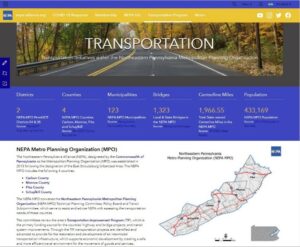The Latest News from PA Chapter of APA…
In this age of constant adaption and evolution, technology seems to be one of the biggest change agents of all. It’s tough to keep up at times! This month, read about web-based engagement platforms for GIS in Northeastern PA, social media secrets of a nonprofit in Lancaster County, and using technology to improve public input and engagement in an often-cantankerous community – Lower Merion Township. Enjoy!
This session will provide a more in-depth look at a variety of ethics scenarios, based on current planning practice. There will be case studies, and discussion associated with each of the core principles of the AICP Code of Ethics, and several other topics of relevant interest, such as social justice, climate change, sustainability, etc. This session will be directed to practicing planners and planning commission members and issues that often come up in public meetings, long-range and current planning situations. CM credit is pending approval. Deadline to register is November 30, 2021
If you’re interested in sponsoring a Webinar Wednesday session or have a session for Webinar Wednesday, please contact us. Send your request to info@planningpa.org.
Opportunities for Giving
Each year the Chapter offers a scholarship to support individuals seeking funds for academic degree programs, internships, and professional development activities. If anyone would like to contribute to the Chapter’s Scholarship fund, donations can be made here. We accept all major credit cards, or you can send a check. Please make your check payable to “PA Chapter of APA Scholarship Fund” and mail it to P.O. Box 4680, Harrisburg PA 17111.
Northeastern Pennsylvania Alliance Hub Site
ArcGIS Hub is an easy-to-configure, web-based engagement platform that connects the general public, partners and internal users with content such as web mapping applications, summary reports, and open data. Organizations, including counties and government agencies, have developed Hub sites to house their data layers and GIS projects in one place.
 The Northeastern Pennsylvania Alliance (NEPA) is a regional community and economic development agency serving the seven counties of Northeastern Pennsylvania. NEPA is also a Metropolitan Planning Organization (MPO) providing transportation planning services to four counties. Last year, NEPA’s GIS staff developed a Hub site to house COVID-related data and information in one place for the public to access.
The Northeastern Pennsylvania Alliance (NEPA) is a regional community and economic development agency serving the seven counties of Northeastern Pennsylvania. NEPA is also a Metropolitan Planning Organization (MPO) providing transportation planning services to four counties. Last year, NEPA’s GIS staff developed a Hub site to house COVID-related data and information in one place for the public to access.
NEPA expanded on the Hub site to communicate, collaborate and share data with local governments, small businesses, and nonprofit organizations. NEPA’s Hub site also provides information and data about transportation projects in the NEPA MPO region. Learn more.
Social Media Management Tips from Uncharted Lancaster
Many planners first come to social media account administration through the *other duties as assigned line in their job description and find it challenging to adapt to the finer points of Facebook, Twitter, Instagram, Linked In, YouTube and whatever the next new thing might be. Last month, Uncharted Lancaster’s Adam Zurn talked to us about his site’s unique flavor of adventure-based engagement & exploration. This time, Adam shares a few essentials that can help you get the most out of the time you put into posting.

Uncharted Lancaster’s founder Adam Zurn, demonstrating what an engaging photo of trail exploration might look like.
First, he advises us to think of social media as hungry. The more you post, or “feed the beast,” as Zurn says, the greater the engagement. But generating content – and customizing it across platforms – is time consuming, so reuse and repurpose what you already have. If your organization has a newsletter, post it in bite-sized pieces. Share tables, charts, and images from your plans and events. Highlight staff and community. If you post something on Wednesday morning, post it again on Sunday afternoon with a new photo or a different lead-in. Repost content from years past but include a new perspective. Reserve a block of time and schedule out a week or a month in advance. Share content with related Groups. You’ll reach people who already have an interest in that area. If they like your post, you can invite them to follow your page. This can be a very productive way to grow your audience. Take a quick look at Uncharted Lancaster’s Facebook Page to see this advice in action.
Social media isn’t an end unto itself. At its root, it’s building connections. Uncharted Lancaster’s website, for example, gets many visitors by way of Facebook. Driving traffic this way takes more than posting and hoping for the best. Know your core audience and interact respectfully with Groups and other Pages that attract that audience. Review your Page metrics and share content at times when people are most likely to see it. Note activity flows in specific Groups and take advantage. Format posts for the medium and emphasize the visual and the intriguing.
The most difficult challenge is standing out in the clutter and chatter of peoples’ online experiences. People (and algorithms) sniff out sales pitches. “The “pitches” might not be literal for most planners, but people are more likely to interact if they get something – an interesting tidbit, a chance to have their voice heard, a sneak peek, a useful tip, an adventure –for their time and attention. An algorithm, on the other hand, may feel like it’s working against you, in hopes you’ll promote the post for a fee.
Account administrators don’t have to use platforms personally, but should absolutely understand each ones purpose and posting climate. Learn about new platforms as they emerge. Instagram, for example, often trips up unfamiliar administrators. It exists to promote brand awareness, so including links in captions or posting complicated calls to action will not only fall flat – they’ll reveal that you’re not platform-savvy, and therefore, probably not a good follow.
Lastly, don’t forget that the real world is a fine source of online engagement. Zurn regularly gives virtual and in-person talks to community groups. Not only do these events provide posting fodder, they connect Uncharted Lancaster to new members of its core audience, many of whom are active on social media.
Award Winner: Lower Merion Zoning Code
On October 19, 2021, the PA Chapter of the American Association held its Annual Awards Luncheon in Pittsburgh, PA, over 300 attendees celebrated the esteemed award winners of this year’s highly competitive program.
This month’s newsletter features a 2021 Award Winner for a Project, Program, or Practice – the Lower Merion Township Zoning Code Public Participation Process. The winners of the award were the Lower Merion Township Building and Planning Department, Montgomery County Planning Commission, and DPZ Associates.
Since its inception in 1927, the Lower Merion zoning code has been continuously updated until the 2020 comprehensive rewrite, predicated upon the 2016 comprehensive plan. The result was a hybrid code designed to preserve the 19th and early 20th century railroad suburb with form-based standards to guide growth and redevelopment of the community.
Critical to this process was extensive public engagement guided by Township Staff. The process began with translating hundreds of publicly generated recommendations from the comprehensive plan. The staff then developed a dedicated webpage, utilized social media, and implemented an interactive zoning map to inform residents. Staff coordinated the Civic Engagement Committee, which conducted monthly stakeholder interviews, small group meetings, and large group meetings with civic organizations, institutions, and business owners. Staff also facilitated 42 public meetings and five open houses. The engagement process was concurrent with code drafting and resulted in a seamless feedback loop of project improvement. A one-day charrette was held with the Montgomery County Planning Commission, developers, engineers, architects and attorneys to test the draft code, resulting in final calibrations prior to advertisement for adoption.
The two-year civic engagement process created a culture of trust, resulting in unanimous adoption of the plan by all fourteen township commissioners.


